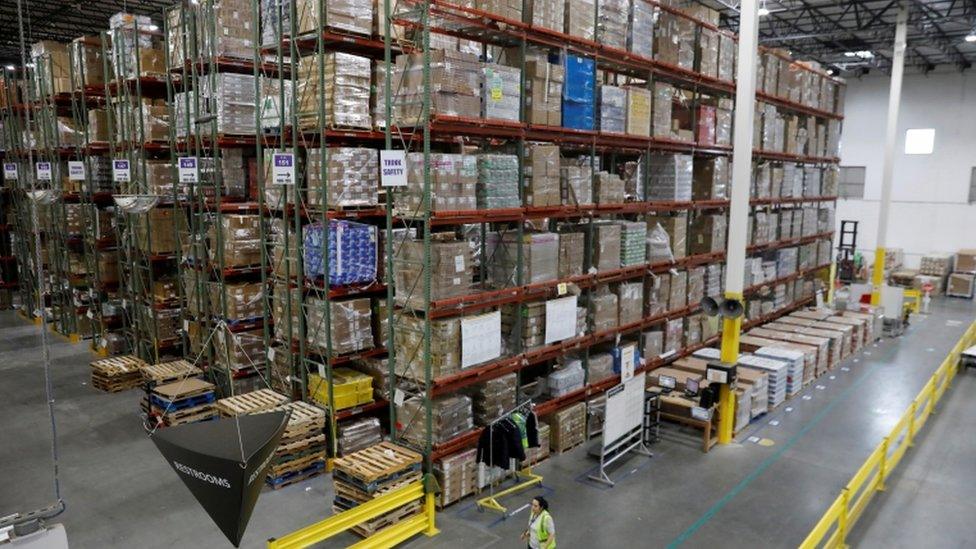Amazon's next big thing may redefine big
- Published
Amazon executive Werner Vogels on the ethics of facial recognition
"I see Amazon as a technology company that just happened to do retail," begins Werner Vogels, Amazon's chief technology officer.
"When Jeff [Bezos] started Amazon, he wasn't thinking about starting a bookshop. He was really fascinated by the internet.”
Only "mortal humans", he tells me in an interview, ever saw Amazon as merely a retailer. So the question now is: what will Amazon become next? And are mere mortals ready for it?
Its recent Re:Mars event in Las Vegas demonstrated clearly - through presentations about machine-learning, robotics and space - that the firm is going through a transition phase that, if successful, will redefine its relationship with the public.
Amazon's incredible, sophisticated systems are no longer being used just to serve up good deals, fast delivery times, or cheap web storage. Its big data capabilities are now the tool of police forces, and maybe soon the military. In the corporate world, Amazon is positioning itself to be the “brains” behind just about everything.
In short, New Amazon could make today's Amazon look quaint in both scale and power.
Next major phase
Amazon, of course, knows this. Which is why, for an entire week earlier this month, the firm, typically reluctant to engage too deeply with the press, did so with enthusiasm: dinners, interviews, and remarkably frank discussions about its ambitions.
Among the Re:Mars speakers was Mr Vogels. He’s considered - alongside Mr Bezos - one of the company's true visionaries. That's in part thanks to his involvement with building the IT architecture behind Amazon Web Services, and helping the division's chief Andy Jassy convince thousands of organisations to adopt it.
As of now, AWS accounts for most of Amazon's profits.
It essentially meant companies that couldn't or didn't want to buy big servers of their own now could buy just the computing power and storage that they needed - and that their virtual server space would grow (or shrink) in accordance with their needs.
As a result, Amazon provides the infrastructure backbone for major firms such as AirBnB and Netflix, as well as more than one million other clients who collectively give Amazon "control" of large swathes of the web. When AWS suffered a technical glitch in 2017, tech site Gizmodo said it simply "destroyed the internet". There are competing major cloud platforms - from Microsoft and Google - but AWS is on top.
The firm is now looking to have a similar impact with the next major phase in computing: machine-learning and artificial intelligence. ML and AI, for short.
“There's only a certain set of problems for which you need to build new algorithms,” Mr Vogels tells me, suggesting for everything else, companies should just use Amazon.
“The use of machine-learning will greatly explode if everyone can do it.”
He wants to offer companies access to technologies they could not create themselves, such as Textract (“automatically extracts text and data from scanned documents”) or Lex, which uses the same technology as the Alexa voice assistant to turn voice recordings into text.

Amazon is best known by consumers for its retail website
‘Not my decision’
Among the tools it is offering, Amazon’s image recognition product is the most controversial. For a per-minute fee of a few pence, Amazon Rekognition can scan video footage and, for example, pick up people’s faces that can then be checked against a client’s database.
Civil rights groups have called it “perhaps the most dangerous surveillance technology ever developed”, and called for Amazon to stop selling it to government agencies, particularly police forces. City supervisors in San Francisco banned its use, saying the software is not only intrusive, but biased - it’s better at recognising white people than black and Asian people.
Mr Vogels doesn’t feel it's Amazon’s responsibility to make sure Rekognition is used accurately or ethically.
“That’s not my decision to make,” he tells me.
“This technology is being used for good in many places. It’s in society’s direction to actually decide which technology is applicable under which conditions.
“It’s a societal discourse and decision - and policy-making - that needs to happen to decide where you can apply technologies.”
He likens ML and AI to steel mills. Sometimes steel is used to make incubators for babies, he says, but sometimes steel is used to make guns.
‘Add a comma’
Amazon’s head of Alexa, Dave Limp on privacy concerns
Amazon’s new forays will attract scrutiny. In its immediate future, it - along with other tech giants - has to answer claims of being anti-competitive, and calls from some presidential candidates for it to be broken up. If it succeeds in its vision to use data to provide ML and AI to the masses, defending itself might become more difficult.
Amazon will need to answer continued questioning about how it handles user privacy, and whether it is being entirely up-front with users when it comes to how data is stored and analysed.
A small taste of this has come from the recent furore over its Alexa smart voice assistant, more than 100 million of which have been sold worldwide.
Reports earlier this year revealed how in some instances, isolated, anonymised recordings were being listened to by human staff - a possibility you could argue isn’t explicitly stated in the firm’s privacy policy.
“It’s a tiny fraction of 1% of the voice recordings,” explained Dave Limp, Amazon’s head of Alexa, to the BBC.
“And obviously customers have complete control of those voice recordings. So if anybody's concerned, they can delete those recordings.”
He conceded, however, that the company could perhaps make it clearer to its customers in future.
“I think we could add a comma and be more specific,” he said of the firm’s privacy policy.
We’ll have to wait and see if it actually does.

Amazon was criticised for not giving enough information about what is done with data gathered by its smart speakers
Work to do
Amazon points to the many benefits this kind of technology can bring at scale - particularly machine-learning efforts that are able to sift through information at a rate no human team, however large, ever could.
For instance, Rekognition is being used by an anti-sex-trafficking non-profit organisation, Thorn, to scrape classified ad sites and search for matches against a database of missing teenagers.
But events like Re:Mars demonstrate that Amazon knows it has work to do in gaining the public’s trust in order to go ahead with its ambitions.
One non-Amazon guest on stage, the AI pioneer Andrew Ng, gave a pretty scathing review of the technology industry’s reputation - and food for thought for his hosts.
“Even as we lead the world through multiple waves of technological disruption, we’ve not always provided the best leadership.
“With the rise of the internet, we’ve created tremendous wealth, but we also contributed to wealth inequality.
“Let’s make sure that this time, with the rise of AI, we take everyone along with us.”
_______
Follow Dave Lee on Twitter @DaveLeeBBC, external
Do you have more information about this or any other technology story? You can reach Dave directly and securely through encrypted messaging app Signal on: +1 (628) 400-7370
- Published13 June 2019

- Published21 May 2019

- Published26 December 2018

